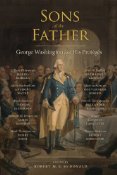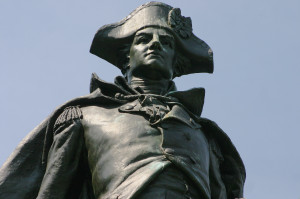
Sons of the Father: George Washington and His Proteges
 Sons of The Father is a collection of essays written mostly by academic historians. The scholarship of the authors is readily apparent in the quality of the writing. But the essays were not the dry academic prose one might expect from snooty academics. They were uniformly interesting and each culminated in a very useful bibliography tied to the footnotes that the writers used to support their various theses.
Sons of The Father is a collection of essays written mostly by academic historians. The scholarship of the authors is readily apparent in the quality of the writing. But the essays were not the dry academic prose one might expect from snooty academics. They were uniformly interesting and each culminated in a very useful bibliography tied to the footnotes that the writers used to support their various theses.
The Sons metaphorically referred to in the title are ten men who were greatly influenced by George Washington. All but one of them knew him personally. The outlier was Captain Robert Kirkwood. Kirkwood was a Revolutionary War hero, and a gallant and brave soldier in the United States Army during Washington’s first administration. He exemplified the esprit de corps that Washington successfully instilled in the cadre of junior officers who served under him. He is one of two men featured in the book (other than Washington himself), who genuinely provide unequivocal examples of what it means to be a man of honor. This reviewer’s interest was definitely piqued after learning something of Kirkwood from Thomas Rider’s excellent limn. Rider was at the forefront of countless battles during the Revolution and was killed fighting British sponsored Indians in Indiana during Washington’s presidency. According to Rider’s account, Kirkwood led by example and took Washington’s directives seriously for establishing a professional corps. The men he led formed an elite group of partisan soldiers who were indispensable. Rider explains:
Partisans of the 18th century were not necessarily guerrilla fighters or irregulars as they are today. American partisan detachments frequently consisted of irregulars, to include light infantry and light cavalry. Sometimes rifleman and other militia augmented the Continentals. In order to move rapidly over great distances and act independently of the main army, the men in these units had to possess an even higher state of discipline than the average Continental, and the officers had to have the ability to exercise initiative, sometimes independently of supervision by superior officers. The light forces Kirkwood served with excelled at reconnaissance, foraging, raids against enemy detachments, intimidation of loyalists, and covering force operations for the main army. From October 1780 through January 1782, Kirkwood and his men performed these missions, usually as part of a larger part partisan force, but sometimes as an independent, company-sized detachment.
Kirkwood was furloughed from the army in January of 1782. But, after marrying and starting a family, his wife died a few short years later in 1787. At this point, Kirkwood moved west for a new start. But when the Indians threatened his new home (instigated by the British), “he resumed the role for which he had been so well suited in the Revolution — that of infantry company commander.â€
Kirkwood fell under the command of the ill-fated Arthur St. Clair and died on the banks of the Wabash River.
Henry Lee described Kirkwood’s final moments: “The gallant Kirkwood fell, bravely sustaining his point of the action. It was the thirty-third time he had risked his life for his country; and he died as he had lived, the brave, meritorious, unrewarded, Kirkwood.â€
The other man covered in this book (other than Washington) who, in this reviewer’s opinion, deserves unqualified admiration, defeated the Indians who slaughtered St. Clair’s army. His name was “Mad†Anthony Wayne.
It is because of Anthony Wayne that this book made it to the top of this reviewer’s reading queue. It was reading about his performance in the battle against the Indians that killed Kirkwood that heightened interest in Sons of The Father. (Refer to the footnote in the upcoming review of Harlow Giles Unger’s Mr. President.)
As it turns out, this episode in Wayne’s life was only the tip of the iceberg. Ironically, although Wayne practically worshipped Washington and served him exceedingly well, he was never truly appreciated by his commander. Nevertheless, Wayne revered him.
 Mary Stockwell paints a poignant and melancholy picture of a man who sacrificed everything for his country. Washington certainly recognized Wayne’s talents, but his opinions of the man were colored by an unfortunate set of circumstances in the two men’s lives. Wayne had a young family and a wife that grew less and less tolerant of his prolonged absences during the Revolutionary War. At one particular point, after taking on many thankless tasks for his commander, always without complaint or question, Wayne’s family was disintegrating and he hadn’t seen his children in years. When Wayne approached Washington about a brief leave of absence, Washington was unimpressed and angry. Wayne didn’t know it, but Washington had just lost his stepson and had been unable to attend his funeral.
Mary Stockwell paints a poignant and melancholy picture of a man who sacrificed everything for his country. Washington certainly recognized Wayne’s talents, but his opinions of the man were colored by an unfortunate set of circumstances in the two men’s lives. Wayne had a young family and a wife that grew less and less tolerant of his prolonged absences during the Revolutionary War. At one particular point, after taking on many thankless tasks for his commander, always without complaint or question, Wayne’s family was disintegrating and he hadn’t seen his children in years. When Wayne approached Washington about a brief leave of absence, Washington was unimpressed and angry. Wayne didn’t know it, but Washington had just lost his stepson and had been unable to attend his funeral.
This one instance apparently colored Washington’s perception of Wayne’s devotion to the cause. Washington didn’t grant the request, instead sending him to fight in the South. Wayne did his duty and went on to become very successful in dealing with a real mess in Georgia, but not before almost being killed by a surprise attack of Creek Indians. The fighting in the South was brutal and Wayne never fully recovered from it.
Wayne survived the war on the southern frontier and went on to retake Georgia from the loyalists. He rejoined the rest of the Army in South Carolina and helped win that state from the British. While he became a hero in the eyes of many Southerners especially, the cost to his own life could hardly be counted. He never fully recovered in mind and body from the trauma of Georgia, and forever remembered that this campaign made him “satiate with this horrid trade of blood.â€Â His letters from Georgia, especially to the wife whom he lost emotionally forever in this campaign, are moving, dramatic, and even poetic.
There is much more than this, of course, than can be covered in a review. Stockwell does a fantastic job with her depiction of Wayne and, for this alone the book is worth reading.
Not all of the “sons†featured in the book get as sympathetic a treatment as do Wayne and Kirkwood.  Jefferson doesn’t fare too well. While no one would deny Jefferson’s contributions to the founding of the United States, in the opinion of this reviewer, as person, his character sometimes left a lot to be desired. In this, perhaps Brian Steele, the author of the essay on Jefferson featured in Sons of The Father, would probably agree. The picture he paints of Jefferson is one of unalloyed political ambition. He shows how Jefferson sought to trade on Washington’s fame and popularity after his death and to shape him into something he probably wasn’t. Recognizing that Washington was perhaps synonymous with the Federalist party, Jefferson cleverly recast him as non-partisan, and small “r†republican through and through. One is reminded of modern attempts to cast Ronald Reagan as bi-partisan.
While it is true that Washington tried to reconcile the differences between the two strongest personalities in his first cabinet, Jefferson and Hamilton, Hamilton won the day with his arguments. Ultimately, Washington could no longer put up with Jefferson’s backstabbing and sneaky ways. Jefferson resigned and went back to Monticello to lick his wounds and plot.
If this seems unfair, read this essay!
James Monroe isn’t portrayed as harshly as Jefferson, but he also is looked at under a fairly bright light. It’s interesting to read this essay in contrast with the somewhat hagiographical account given by Harlow Giles Unger (reviewed here.) This isn’t to say that Monroe wasn’t a good guy, but there was an awful lot that Unger left out. The essay featured in Sons of The Father by William M. Ferrraro is perhaps a bit more balanced.
All the essays in this book were excellent and this reviewer was surprised at their depth and quality, given their relative brevity. The unifying theme is, of course, Washington himself. The reader gets a broad perspective on the man through the eyes of those he influenced. All of the men covered in this book respected Washington and recognized a rare greatness. Some of them sought to emulate that greatness, but all were influenced by him.
 The posts are coming!
The posts are coming!


0 comments
Kick things off by filling out the form below.
Leave a Comment